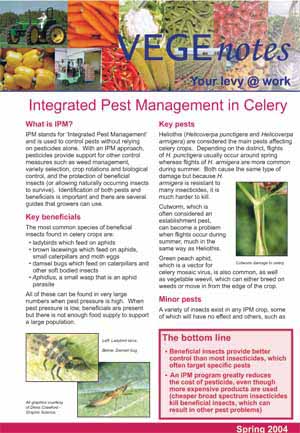|
|
IPM stands for ‘Integrated Pest Management’ and is used to control pests without relying on pesticides alone. With an IPM approach, pesticides provide support for other control measures such as weed management, variety selection, crop rotations and biological control, and the protection of beneficial insects (or allowing naturally occurring insects to survive). Identification of both pests and beneficials is important and there are several guides that growers can use. Common beneficial insects found in celery crops include:
Celery Pests: Heliothis (Helicoverpa punctigera and Helicoverpa armigera) are considered the main pests affecting celery crops. Depending on the district, fl ights of H. punctigera usually occur around spring whereas flights of H. armigera are more common during summer. Both cause the same type of damage but because H. armigera is resistant to many insecticides, it is much harder to kill. Cutworm, which is often considered an establishment pest, can become a problem when flights occur during summer, much in the same way as Heliothis. Green peach aphid, which is a vector for celery mosaic virus, is also common, as well as vegetable weevil, which can either breed on weeds or move in from the edge of the crop. An IPM program greatly reduces the cost of pesticide, even though more expensive products are used (cheaper broad spectrum insecticides kill beneficial insects, which can lead to other pest problems) |
|

